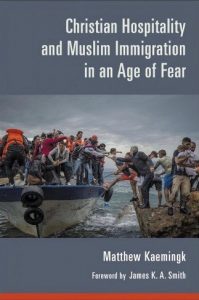Books / Community / Hospitality / Pluralistic World
Christian Hospitality and Muslim Immigration in an Age of Fear (Matthew Kaemingk, 2018)

Welcoming Muslims
Everyone knows that immigration is a divisive topic today. In America, Europe and beyond massive numbers of people are on the move and when such migrations unfold the lives of the migrants and their new neighbors are upended. In the U.S. it’s well known that the laws governing this issue are in need of being updated but our national political leadership seems far more concerned with getting reelected than tackling hard decisions.
Christian Hospitality and Muslim Immigration in an Age of Fear is an essential book for Christians to read. It addresses a topic that is in our national conversation, prompting intense debate and strong emotion. Even if we don’t bring it up chances are our neighbors, colleagues and the media will. Our society is so politicized that most of the time when Christians talk about Muslim immigration what we hear is a conservative or progressive take on the topic dressed up with a few Bible texts to lend a faint religious veneer to the position. “The failure of Christian theology to articulate a complex, nuanced affirmation of plurality and difference,” James K. A. Smith notes, “too often translates into heretical nationalism or naïve, progressivist assimilationism” [p. x]. Few believers have done the hard, necessary work of digging into the Scriptures to develop a distinctly Christian and biblical perspective on the topic. This is precisely what Matthew Kaemingk, assistant professor of Christian ethics at Fuller Theology Seminary, does in Christian Hospitality and Muslim Immigration in an Age of Fear. His book is must reading for Christians not merely for the conclusions he draws but for his approach to the topic. This is an example of the sort of public theology in which we need to engage in our increasingly secular and post-Christian age.
Within Western Christianity there are two primary traditions of public theology. One is Roman Catholic; it traces its lineage from Augustine through Aquinas to today. The other is Protestant, or Reformed, and traces its lineage from Augustine to Calvin to Abraham Kuyper to today. The two traditions tend to come to remarkably similar conclusions on most issues, though being Reformed myself, I prefer the Kuyperian with its emphasis on clear biblical foundations. Kaemingk stands in this rich tradition of thought.
After carefully working through how Christians should think about Muslim immigration, Kaemingk identifies a series of practical steps we can take to be increasingly faithful. He also points out that we are not the first to face this issue. Europe is far ahead of us, and Kaemingk uses the experience in the Netherlands as a case study because it was there that a vigorous and biblical perspective on the topic was developed and applied. He argues, correctly, that learning to be faithful in welcoming our Muslim neighbor we will not only find our faith refreshed but that we will also deepen our understanding and practice of democracy.
The grace that evangelicals have received in their hearts can—and must—be lived out in every aspect of their public lives alongside their Muslim neighbors. As evangelicals interact with Islam at work and school, in politics and business, through the media and the marketplace, the hospitality they have received from Christ must be given to their Muslim neighbors.
Rather than looking at their Muslim neighbors through the lenses of the world (security concerns, cultural clashes and controversies, and so on), American evangelicals must view their Muslim neighbors first and foremost through their primary lens—Jesus Christ. Christ’s sovereignty, humility, nakedness, hospitality, sacrifice, and healing must be the ultimate framework through which American evangelicals not only see but also engage their Muslim neighbor. [p. 297-298]
The reason that the question of immigration is so heated is that it touches on the deepest issues of what we believe as a nation and as individuals. What is at stake here is not merely the question of what policies we should oppose and support on a national level, but the gospel itself and the future of our fragile American experiment in freedom.
I recommend Christian Hospitality and Muslim Immigration in an Age of Fear to you. Please read and discuss it, and give copies to friends.
Book recommended:Christian Hospitality and Muslim Immigration in an Age of Fear by Matthew Kaemingk (William B. Eerdmans; 2018) 305 pages + bibliography + index.

